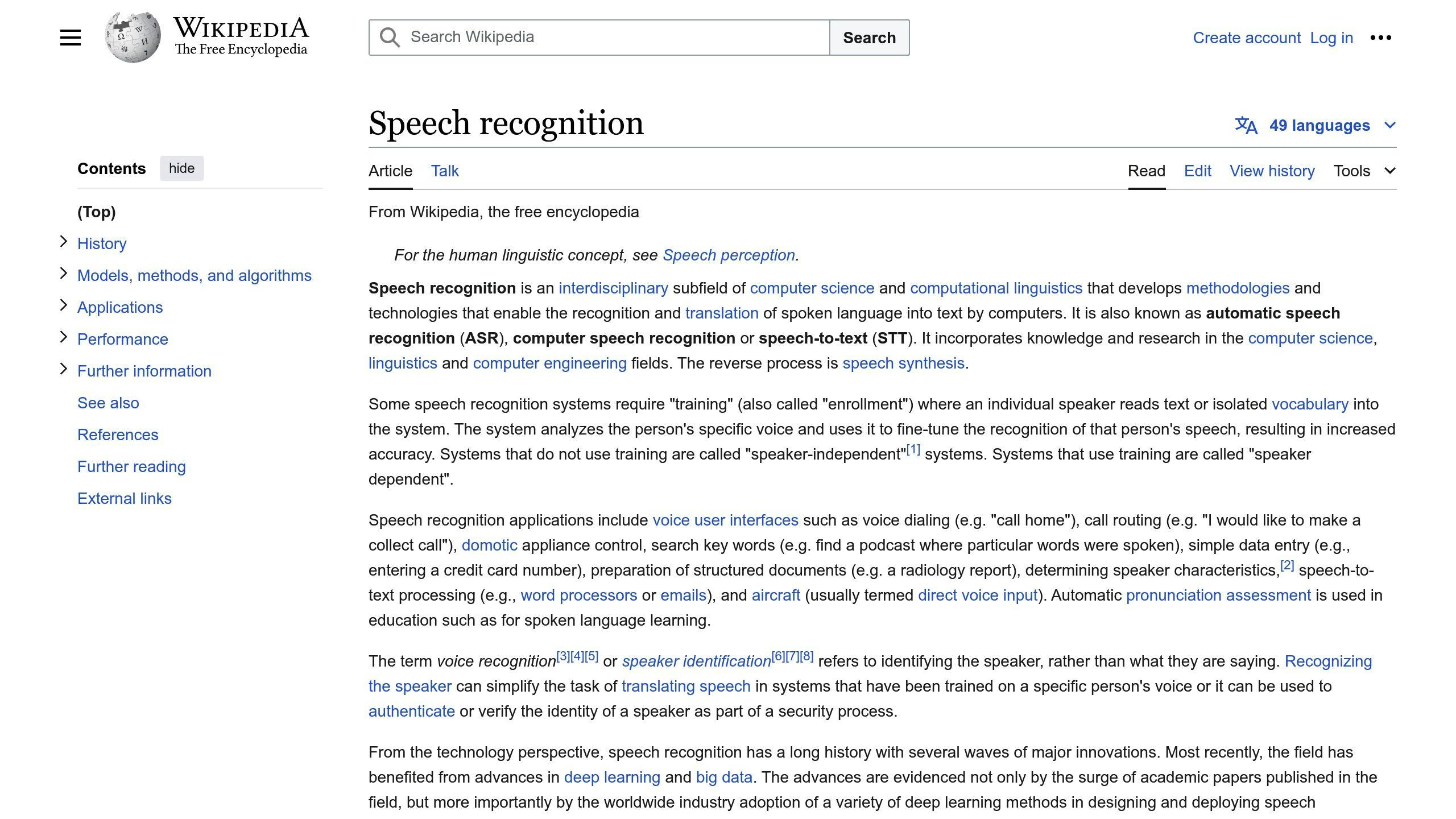Writing a script for your podcast is crucial to ensure a well-structured and engaging episode. A script provides:
- Organization: Outlines key topics and segments to cover
- Consistency: Maintains a cohesive flow and tone across episodes
- Efficiency: Reduces editing time by minimizing tangents or mistakes
There are three main script types:
| Script Type | Description |
|---|---|
| Narrative | Detailed, word-for-word transcript for fiction or highly-produced shows |
| Outline | Brief bullet points, allowing for improvisation and a conversational tone |
| Hybrid | Combines detailed sections with room for flexibility and spontaneity |
When creating your script, follow these best practices:
- Use everyday language and a conversational tone
- Incorporate delivery notes for pacing, emphasis, and tone
- Allow flexibility for improvisation and natural flow
- Practice reading the script aloud before recording
- Consider using speech-to-text tools for a more natural delivery
The key is finding the right balance between structure and spontaneity. Experiment with different scripting methods to discover what works best for your podcast format and personal preferences.
Related video from YouTube
Types of Podcast Scripts
Podcast scripts come in different forms to suit various needs. Here are the main types:
Narrative Scripts
Narrative scripts are detailed, word-for-word transcripts used for fiction or highly-produced shows. They provide a structured approach to storytelling, ensuring every element, from dialogue to sound effects, is carefully planned. These scripts are ideal for podcasters creating immersive stories with complex characters and plotlines.
Outline Scripts
Outline scripts consist of bullet points or brief notes, allowing for improvisation. They provide a general structure for the episode, outlining key topics, segments, and transitions. This approach suits podcasters who prefer a conversational tone and want to leave room for spontaneity.
Hybrid Scripts
Hybrid scripts combine detailed sections, like intros and outros, with room for improvisation in other segments. They balance structure and flexibility, ensuring a polished show without sacrificing a natural flow.
Here's a comparison of these script types:
| Script Type | Description | Best For |
|---|---|---|
| Narrative | Detailed, word-for-word transcript | Fiction or highly-produced shows |
| Outline | Bullet points or brief notes | Conversational, improvised shows |
| Hybrid | Combination of detailed and flexible sections | Balancing structure and spontaneity |
The right script type depends on your show's format and personal preferences. The key is using a script as a tool to enhance your podcast, not limit its potential.
Creating a Clear Podcast Script
Crafting an effective podcast script requires careful planning, organization, and writing. A well-designed script ensures a smooth flow of ideas, keeps your audience engaged, and helps you achieve your podcasting goals.
Planning and Preparation
Before writing your script, identify your target audience, define your podcast format, and brainstorm topics. Conduct research to gather valuable information to share with your listeners. Consider:
- Who is your target audience?
- What are their interests or challenges?
- What format will your podcast take (interview, storytelling, educational, etc.)?
- What topics will you cover, and how will you structure your episodes?
Structure and Flow
A well-structured script ensures a logical flow of ideas and keeps your listeners engaged. Consider the following:
- Outline your main sections (introduction, body, conclusion)
- Plan your transitions between sections
- Use storytelling techniques to make your content relatable
- Use clear and concise language to convey your message
Key Script Elements
A podcast script typically includes the following essential components:
| Element | Description |
|---|---|
| Introduction | Introduce yourself, your podcast, and the topic |
| Guest Intro | Introduce your guest, if applicable |
| Sponsor Message | Include any sponsored content or ads |
| Call to Action (CTA) | Encourage listeners to take action (subscribe, review, etc.) |
| Outro | Summarize the episode and provide a final thought |
sbb-itb-bc761f5
Script Templates and Examples
Podcast scripts come in various formats, and using the right templates and examples can help you create effective scripts for your show. In this section, we'll explore templates for different formats, examples of effective script sections, and a comparison of script types.
Templates for Different Formats
Podcast scripts can be categorized into three main formats: solo, interview, and co-hosted. Each format requires a unique approach to scripting. Here are some templates to get you started:
| Format | Template |
|---|---|
| Solo | Introduction, Main Topic, Transition, Call-to-Action, Outro |
| Interview | Introduction, Guest Intro, Main Topic, Transition, Call-to-Action, Outro |
| Co-hosted | Introduction, Main Topic, Transition, Call-to-Action, Outro, Co-host Banter |
Effective Script Sections
A well-crafted script includes essential sections that engage your audience and convey your message clearly. Here are some examples of effective script sections:
- Introduction: Grab your audience's attention with an engaging intro that sets the tone for your podcast.
- Main Topic: Outline your main points and provide supporting details or examples.
- Transition: Use phrases to smoothly move between your main points and keep your audience focused.
- Call-to-Action: Encourage your audience to take action, such as subscribing or leaving a review.
- Outro: Summarize your main points and provide a final thought or teaser for your next episode.
Script Type Comparison
Here's a comparison of narrative, outline, and hybrid scripts:
| Script Type | Description | Pros | Cons |
|---|---|---|---|
| Narrative | Tells a story with a clear beginning, middle, and end | Engaging, easy to follow | May not suit complex topics |
| Outline | Organizes information into a logical structure | Simple to create, flexible | May lack creativity |
| Hybrid | Combines narrative and outline elements | Engaging and informative, flexible | May be challenging to execute |
Writing Tips and Best Practices
Use Everyday Language
When writing your podcast script, aim for a conversational tone that sounds like how you would speak in real life. This helps create a more engaging experience for your listeners. Avoid overly formal or complex words that could make your content sound stiff or unnatural. Instead, use simple words and phrases that you would typically use in everyday conversations.
Add Delivery Notes
Incorporate delivery notes into your script to guide your pacing, tone, and emphasis during recording. These notes can indicate where to pause, stress certain words or phrases, adjust your volume, or convey specific emotions. For example, you might use "//" to indicate a brief pause or underline a word to emphasize it. Delivery notes help bring your script to life and make it sound more natural.
Allow for Flexibility
While a script provides structure and ensures you cover all the key points, it's essential to leave room for spontaneity. Avoid rigidly sticking to your script word-for-word, as this can make your delivery sound robotic or rehearsed. Instead, treat your script as a guide and allow yourself to deviate from it when appropriate, such as adding personal stories or responding to unexpected developments during recording.
Practice Before Recording
Before hitting the record button, take the time to practice reading through your script out loud. This will help you identify any awkward phrasing, tongue twisters, or areas that need clarification. It will also allow you to become more comfortable with the material and develop a natural flow. Practicing your script can make a significant difference in the overall quality and delivery of your podcast.
Use Speech-to-Text Tools

Consider using speech-to-text tools to capture your thoughts and ideas in a more natural way. By speaking your script instead of typing it, you can create a more conversational tone that sounds less scripted. However, be prepared to edit the transcribed text for clarity and coherence, as speech-to-text technology is not always 100% accurate.
| Tip | Description |
|---|---|
| Use Everyday Language | Aim for a conversational tone, using simple words and phrases you would use in everyday conversations. |
| Add Delivery Notes | Incorporate notes to guide your pacing, tone, and emphasis during recording. |
| Allow for Flexibility | Leave room for spontaneity and don't rigidly stick to your script word-for-word. |
| Practice Before Recording | Read through your script out loud to identify any issues and develop a natural flow. |
| Use Speech-to-Text Tools | Capture your thoughts and ideas in a more natural way by speaking your script instead of typing it. |
Conclusion
The Importance of Podcast Scripts
Writing a podcast script is crucial for creating a well-structured and engaging episode. It helps you:
- Stay organized
- Ensure consistency
- Save time in the long run
By following the tips and best practices outlined in this article, you can craft a script that effectively communicates your message and resonates with your audience.
Try Different Scripting Methods
Don't be afraid to experiment with different scripting methods to find what works best for your podcast. Try:
- Narrative scripts
- Outline scripts
- Hybrid scripts
Discover what suits your style and tone. Remember, scripting is a process, and it may take some trial and error to find the perfect balance.
Finding the Right Balance
The key to a successful podcast script is finding the right balance between structure and spontaneity. While a script provides a clear outline, it's essential to leave room for improvisation and flexibility. By doing so, you can create a natural flow that engages your listeners and makes your content more relatable.
FAQs
What makes a good podcast script?
A good podcast script provides a clear outline while allowing natural conversation. It should include:
- An engaging introduction to hook listeners
- Smooth transitions between segments
- Key talking points and stories
- Room for improvisation and personality
Example: "Hello and welcome to [Podcast Title], exploring [topic/theme]. I'm your host [Name]. Today we'll discuss [main points] with guest [Guest Name]. We'll get their insights on [episode focus] and uncover useful tips."
How long should a script be?
The ideal length varies, but a general guide is:
- Fully scripted episodes: 45-65 pages for 1 hour
- Outline scripts: 1-2 pages hitting main points
Find the right balance between structure and natural flow for your show's format.
What format should a podcast script follow?
A typical podcast script includes:
- Introduction (hook, guest intro if applicable, topic overview)
- Segmented talking points or stories
- Transitions between segments
- Conclusion (recap, call-to-action)
- Outro (credits, sponsorship, etc.)
Adapt the format to your show's needs - narrative, conversational, or hybrid styles.
How do you plan a podcast script?
- Set clear goals for the episode
- Outline the main topics and stories
- Write in a conversational tone
- Plan smooth transitions
- Note key points but allow improvisation
How do you write a podcast script?
- Set episode goals and main discussion points
- Provide context for each segment
- Write as you would speak in conversation
- Include planned transitions
- Cover key points but leave room for creativity
- End with a concise conclusion and call-to-action
![Thumbnail for: AI Content Creation Guide: 5 Key Facts [2024]](https://assets.seobotai.com/web.tapereal.com/6783128ad4527889dd6e5ca9-1736650534904.jpg)


